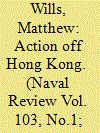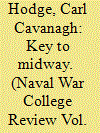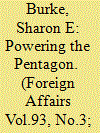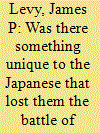|
|
|
Sort Order |
|
|
|
Items / Page
|
|
|
|
|
|
|
| Srl | Item |
| 1 |
ID:
138017


|
|
|
| 2 |
ID:
144480


|
|
|
|
|
| Publication |
New Jersey, Chartwell Books Inc., 1976.
|
| Description |
255p.: ill.hbk
|
| Standard Number |
0890090815
|
|
|
|
|
|
|
|
|
|
|
|
Copies: C:1/I:0,R:0,Q:0
Circulation
| Accession# | Call# | Current Location | Status | Policy | Location |
| 019049 | 940.541342/MAY 019049 | Main | On Shelf | General | |
|
|
|
|
| 3 |
ID:
138701


|
|
|
|
|
| Summary/Abstract |
Was the battle of Midway won or lost? In a recent edition of the Naval War College
Review, James Levy grappled with some of the recurrent issues found in the scholarship of the battle of Midway, all of them related to the question whether one or another aspect of the Japanese way of war led to a catastrophic defeat at the hands of the U.S. Navy.
|
|
|
|
|
|
|
|
|
|
|
|
|
|
|
|
| 4 |
ID:
130465


|
|
|
|
|
| Publication |
2014.
|
| Summary/Abstract |
The Defense Department is the United States' largest energy consumer, but it's also a major incubator of cutting-edge technologies. To cut fuel demands and meet new threats, the Pentagon is transforming the U.S. military from an organization that uses as much fuel as it can get to one that uses only as much as it needs.
In the immediate aftermath of World War II, the U.S. naval aviator Thomas Moorer questioned Takeo Kurita, a former vice admiral of the Imperial Japanese Navy, as part of the U.S. military's postwar interrogation of Japanese commanders. Kurita told Moorer that one of the most significant reversals of fortune Japan had suffered during the war was the loss of fuel supplies. "We ran out of oil," Kurita said, and by the end of the war, the Japanese military had grown so desperate, it was operating its equipment on fuel distilled from old tires, rice, and even pine needles. "What I learned then," Moorer would note years later, "was never lose a war, and the way to lose a war is to run out of oil."
|
|
|
|
|
|
|
|
|
|
|
|
|
|
|
|
| 5 |
ID:
121689


|
|
|
|
|
| Publication |
2012.
|
| Summary/Abstract |
In a little known episode of history, the Imperial Japanese Navy (IJN) seized Christmas
Island unopposed on 31 March 1942. Pre-landing air and naval bombardments led the tiny
garrison to surrender, but also damaged key facilities, frustrating Japanese efforts to quickly
remove the valuable phosphate ore. When Japanese engineers determined the island was not
suitable for the construction of an airfield, the occupying force was left solely reliant upon
sea lanes of communication, vulnerable to submarine interdiction. A late-1943 submarine
attack led to the IJN's complete withdrawal from its Christmas Island outpost.
|
|
|
|
|
|
|
|
|
|
|
|
|
|
|
|
| 6 |
ID:
133083


|
|
|
|
|
| Publication |
2014.
|
| Summary/Abstract |
We military historians have a tendency to obsess over the causes of victory and defeat in war. Like economists, we have a profound desire to identify those actions that ensure success or generate failure, and like economists we are not overly good at it. At best, we can state the obvious, as when the disparity of forces between two opponents is extreme, or ascertain certain verities, like "It is good to have the better trained troops," or "Keep your troops better equipped, fed, and rested than your opponent's." At worst, this obsession with winning and losing can lead to a lot of shameless Monday-morning quarterbacking and counterfactual historical speculation.
|
|
|
|
|
|
|
|
|
|
|
|
|
|
|
|
|
|
|
|
|